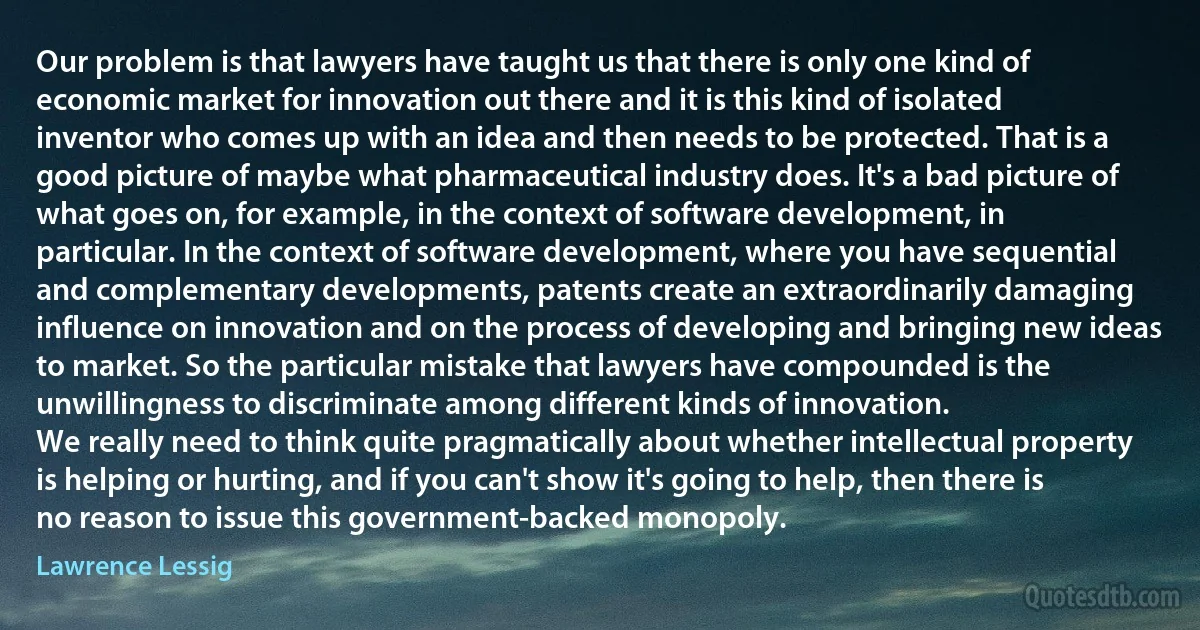
Our problem is that lawyers have taught us that there is only one kind of economic market for innovation out there and it is this kind of isolated inventor who comes up with an idea and then needs to be protected. That is a good picture of maybe what pharmaceutical industry does. It's a bad picture of what goes on, for example, in the context of software development, in particular. In the context of software development, where you have sequential and complementary developments, patents create an extraordinarily damaging influence on innovation and on the process of developing and bringing new ideas to market. So the particular mistake that lawyers have compounded is the unwillingness to discriminate among different kinds of innovation. We really need to think quite pragmatically about whether intellectual property is helping or hurting, and if you can't show it's going to help, then there is no reason to issue this government-backed monopoly.
Lawrence LessigRelated topics
bad comes complementary context damaging developing development different example good helping help idea industry innovation intellectual inventor kind market mistake monopoly need needs pharmaceutical picture problem property quite reason show teach think softwareRelated quotes
For anyone seeking meaning for his life a figure from Greek mythology comes to mind. It is that of Atlas, bearing with endless perseverance the weight of the heavens on his back. - Atlas, resolutely bearing his burden and accepting his responsibility that gives us the example we seek. To seek out and accept responsibility; to persevere; to be committed to excellence; to be creative and courageous; to be unrelenting in the pursuit of intellectual development; to maintain high standards of ethics and morality; and to bring these basic principles of existence to bear through active participation in life - these are some of my ideas on the goals which must be met to achieve meaning and purpose in life.
And finally, the man who knows his purpose in life accepts praise humbly. He knows whatsoever talents we has were given him by the Lord and that these talents must be developed and used. In this way man renders thanks for the Lord's gift - and finds meaning in his life.

Hyman G. Rickover
In art, origin and value cannot be treated as independent. Those who enjoy poetry and painting must be at least dimly aware of a poet beyond the poem and a painter beyond the picture. If by some unimaginable process works of beauty could be produced by machinery, as a symmetrical colour pattern is produced by a kaleidoscope, we might think them beautiful till we knew their origin, after which we should be rather disposed to describe them as ingenious. And this is not, I think, because we are unable to estimate works of art as they are in themselves, not because we must needs buttress up our opinions by extraneous and irrevelant considerations; but rather because a work of art requires an artist. not merely in the order of natural causation, but as a matter of a-sthetie necessity. It conveys a message which is valueless to the recipient, unless it be understood by the sender. It must be expressive.

Arthur Balfour
Neither acquiescence in skepticism nor acquiescence in dogma is what education should produce. What it should produce is a belief that knowledge is attainable in a measure, though with difficulty; that much of what passes for knowledge at any given time is likely to be more or less mistaken, but that the mistakes can be rectified by care and industry. In acting upon our beliefs, we should be very cautious where a small error would mean disaster; nevertheless it is upon our beliefs that we must act. This state of mind is rather difficult: it requires a high degree of intellectual culture without emotional atrophy. But though difficult, it is not impossible; it is in fact the scientific temper. Knowledge, like other good things, is difficult, but not impossible; the dogmatist forgets the difficulty, the skeptic denies the possibility. Both are mistaken, and their errors, when widespread, produce social disaster.

Bertrand Russell
Sight, when used in the context of nature, creates direct communication with reality. It implies that one is involved in this particular reality and quickly leads a person to action. But when the image has become artificial and is purely a means of knowledge, the reaction persists. I feel directly involved in what I see, just as prehistoric people did. And if I am seeing objects or ideas, I am not truly independent; I cannot really take my distance from these objects. From the intellectual point of view, this means I cannot really exercise my critical faculties. The use of images to transmit knowledge leads to the progressive elimination of distance between a person and his knowledge, because of the way we are made to participate when this means is used (this is, of course, in perfect accord with technical civilization, and to be desired by its standards). The critical faculties and autonomy of the thinking person are also eliminated.

Jacques Ellul
Remember, every business firm, like even a mom and pop grocery store, is a market imperfection. A firm is defined in economic theory as a market imperfection introduced to deal with transaction costs. And the sort of theory is that the imperfections, the firms, are kinda like little islands in a free market sea. But the problem with that is that the sea doesn't remotely resemble a free market, and the islands are bigger than the sea; so that raises some questions about the picture. But these market imperfections, like a firm, or a transnational corporation, or a strategic alliance among them, this is a form of administering interchanges. And there's a real question about whether we want to accept that. Why, for example, should the international socioeconomic system, or for that matter our own society, be in the hands of unaccountable private tyrannies? That's a decision, it's not a law of nature.

Noam Chomsky
